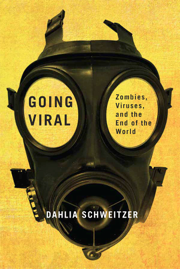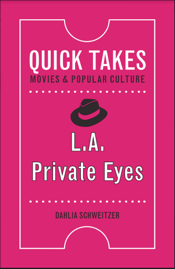
About Dahlia
DAHLIA SCHWEITZER is a pop culture critic, writer, and professor. Described by Vogue as “sexy, rebellious, and cool,” Schweitzer writes about film, television, music, gender, identity, and everything in between. She studied at Wesleyan University, lived and worked in New York City and Berlin, and completed her MA and PhD at the Art Center College of Design and UCLA. She is currently chair of the Film and Media department at the Fashion Institute of Technology in New York City.
In addition to her books, Dahlia has essays in publications including Cinema Journal, Journal of Popular Film and Television, Hyperallergic, Jump Cut, Quarterly Review of Film and Video, and The Journal of Popular Culture. She has also released several albums of electronic music, including Plastique and Original Pickup.

Professor
As a professor of film and media studies, Dahlia exposes her students to a variety of theoretical approaches and cinematic techniques, asking them to approach both with analytical inquisitiveness. Her aim is to pass her own curiosity on to her students, encouraging them to think across their classes and experiences to create intellectual connections between course materials and the world in which they live. She strives to remind her students that the loudest voice is not necessarily correct, and in so doing, helps them find their own.

Media Critic
Declared “one of the world’s leading analysts of popular culture” by renowned author Toby Miller, Dahlia writes about film, television, music, gender, identity, and everything in between. Her work can be found across mainstream, academic, and emergent channels in both long and short form. Repeatedly drawn to popular culture, Dahlia loves to analyze and unpack cultural artifacts in order to explore how they reflect social and historical issues, as well as looking at how they reinforce or interrogate common cultural assumptions.

Author
Dahlia has written numerous books exploring aspects of film and television. Regardless of the topic—serial killers, private detectives, or even zombies—all of her writing engages directly with questions of self versus other, private versus public space, examining depictions of gender, identity, and race. She traces how these depictions evolve and examines what they mean about our changing world. In her latest project, Dahlia explores the ways haunted homes have become a venue for dramatizing anxieties about family, gender, race, and economic collapse.
Blog
The Scariest Horror Movie of the Year: Don’t Worry Darling
Warning: SPOILERS. Olivia Wilde as Bunny and Chris Pine as Frank in Don’t Worry Darling. I just watched Don’t Worry Darling, Olivia Wilde’s recent film, and much to my surprise, I loved it. Like many others out there, I was guilty of assuming that the film itself could not possibly be better than the behind the scenes drama. And since I read everything I could find (yes, I like escaping into Hollywood gossip with the best of them), it did not feel like there was anything left to...
Why Tár’s Queerness Might Be the Most Disappointing Thing About the Film
When I google reviews of Tár, the first one that comes up proclaims, in all caps, “TAR is a MASTERPIECE.” Subsequent reviews are as glowing if not as effusive. Each one makes me wonder if I saw a different movie. Directed by Todd Field, who supposedly wrote the film exclusively for Cate Blanchett, Tár tells the tale of composer and conductor Lydia Tár (Blanchett) whose abuse of students, colleagues, and staff leads to the implosion of her career. Armond White’s summary of...
Why Does Netflix Suck Now?
I was reading this morning about the backlash to one of Netflix’s latest projects, Luckiest Girl Alive, produced by and starring Mila Kunis. Despite the fact that the film contains graphic depictions of a school shooting and gang rape, there is no clear warning of either. There is no indication in the trailer, for instance, that the film will contain these types of moments, and many reviews do not mention them, despite the fact that these scenes are central to the film, leaving some...




